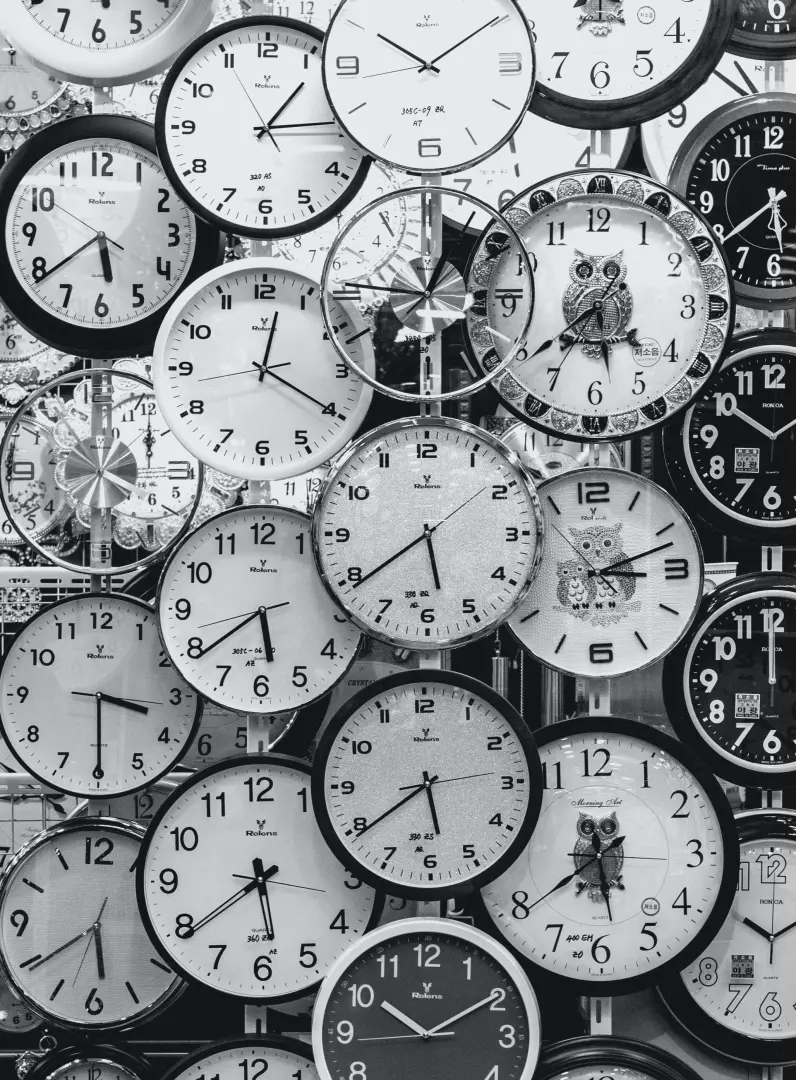

“Time management” is kind of a misnomer. I think we focus so much on the idea of time, that we forget that it is simply a tool. Time is a tool used to measure progress and to make it easier to coordinate between people.
Don’t get me wrong. I’m not saying time is unimportant. I just want to put it in perspective. What I think is much more important is our energy. When we think in terms of energy rather than time, the idea of “not having enough time” goes away. Because by prioritizing your energy, you basically make time work for you.
I believe that if we want to manage our time, we need to honestly look into how we function. It doesn’t matter what’s on your schedule if you’re too tired to focus. If you’re constantly draining yourself, no time management is sustainable. Time means nothing if you don’t have the energy to experience it.
Now, here’s the issue: while time is the same for all of us, our energy levels are completely different. So I’ll be sharing some tools and ways of thinking, but what you decide to use and how you use them to fill your time is completely dependent on you. It might take some trial and error. I’m still figuring it out myself.
Schedule Events and Hard Deadlines
Let’s get the easy one out of the way first. The one that applies to all of us.
Things that respond to the pressure of time. Meetings and deadlines. No matter what, these are stuck on your calendar. You have no choice but to work around them. Figure out what these are first. It doesn’t matter how you’re feeling, or how motivated you are, these things have to happen. It doesn’t matter how good or bad you are at time management, these strict times are inflexible. You must work around these.
Like I mentioned before, time management is about energy and priorities. How the rest of the calendar fills up is dependent on that. But! I will say, the rest of that calendar looks a lot less stressful now that life requirements have filled some of it for me.
Prioritizing Energy
Again, regarding energy, everyone is different.
Listen to your body. This will take some time, especially if you’ve never really listened to it before. Most people need 8 hours of sleep. I know people who are complete night owls, and actually sleep during the day. There are people who go to bed at 11 every night, but if they have a thought in the middle of the night they give up on sleeping and flesh out the thought because they know they wouldn’t be able to sleep otherwise. Then they sleep in later than usual. I am one of those people.
Sleep
Regardless, prioritize sleep first. I actually never set a morning alarm. I go to bed at a certain time and let my body wake up naturally. Nothing feels worse than waking up abruptly when you’re deep in sleep. If that’s not possible, and you’re prone to sleeping in forever unless there IS an alarm, then try to find an alarm that gradually wakes you up over 30 minutes, allowing your body to wake up slowly.
For the sake of this exercise, we’ll pretend we’re going to bed at 11 and waking up at 7, for an easy 8 hours of sleep.
Eat
2nd, prioritize food. Make sure you fill your body with enough sustainable energy. I have to avoid caffeine because I will have a legitimate panic attack which then makes the whole day moot. Too much sugar leads to general fatigue because that Time Management - October 9, 2022 type of energy doesn’t last very long. Learn what your body responds to well and what it doesn’t. Like I said, time management is about how well you can manage yourself.
Relax
3rd, schedule time to relax. Prioritize spending time with friends and/or family. Take time for yourself. Do the things that fill you up and give you joy. That way you can bring your best self to work. If you give yourself the time to have fun and be distracted, you’re less likely to be distracted during work.
I’ll be pretty blunt. If you don’t do these three things first, then time management will never be feasible. Because, again, it’s less about time and more about energy. If you don’t have the energy, you can’t do the work. Plain and simple.
Prioritizing Work
So NOW that our needs are met and we feel energized, we can focus on work. In my opinion, this is the healthiest way to approach time management. Especially when we’re in a place in our lives where we CAN take care of ourselves, I think doing that first will allow us to be the most productive at work. We are more productive when we’re well-rested. Imagine if athletes never rested — we would start watching some pretty bad basketball.
Calendar Blocking
What we just did in the previous was called calendar blocking. You block time not in the minutia, but in general.
- From 11pm-7am, I am asleep.
- From 7–9am, it’s my morning ritual.
- From 9–12, it’s work.
- 12–12:30 is lunch.
- 12:30–5 it’s work.
- 5–6 is relax.
- 6–8 is dinner and time with friends.
- 8–10 whatever the evening brings.
- 10–11 is my evening ritual.
Calendar blocking is good for setting boundaries and knowing what frame of mind you should be in. When in work, do work. When it’s time to relax, relax. And you can be fully present in both of them, since you allocated time for them, which is true time management anyways. It also helps you pace yourself.
Within those blocks, you have tasks. This is where it gets even more dependent on who you are.
Learn to say No
We only have so much time in a month, in a week, in a day. While it might seem noble and exciting to say yes to everything, that can lead to spreading yourself too thin and either not doing anything well, or burning out.
Eat the Frog
Your frogs each day are the tasks that will have the greatest impact on achieving your goals, which are usually the tasks that you’re most likely to procrastinate starting. Eat the frog first. Get it out of the way.
Rocks, Pebbles, Sand
Categorize your work in this way:
Rocks: Your most important strategic projects
Pebbles: Projects and tasks that are important but not the most critical
Sand: Smaller, more insignificant tasks
Tackle the rocks first. If you keep tackling the small things (the sand and pebbles), and not the important strategic items, the rocks, then your jar will quickly fill up with no room for more rocks.
Eisenhower Matrix and 4D Rule
Look at all your tasks. Classify them as either urgent or not urgent, and important and not important. Then follow the 4D rule.
Is a task urgent and important? Do it. It is urgent but not important? Delegate. Is it not urgent but important? Defer, or schedule for another time. Is it not urgent AND not important? Delete it. It’s not a task that contributes anywhere.
Task Batch
From 9–12, what kind of work am I doing? Then what am I doing from 12:30–5? It helps to put similar tasks together. There are a few ways to do this.
Put all your administrative tasks together. Put all your creative tasks together. These require different parts of the brain, so it helps to not jump back and forth but to stay in the same state of mind.
Put low energy tasks together. Put high energy tasks together. Do the low energy tasks during the part of the day when you have the lowest energy. Do the high energy tasks whenever you have the highest energy.
I task batch heavily. I do the work I don’t want to do in the morning when I have the most energy, since I know I won’t do it when I have less energy. I do the work I want to do when I have less energy, since the desire to do it is enough incentive.
ADHD Bonus
If you have ADHD, like I do, you respond strongly to five motivators. Is it fun? Is it interesting? Is it new? Is it challenging? Is it urgent? If it’s none of these, you literally will never do them. If something needs to get done utilize one of the five motivators. If it’s boring, old, and easy, then make it urgent.
Conclusion
There are many ways to manage your time. Start with managing your energy. Then experiment with the different ways of prioritization above to find what works best with your workflow.
